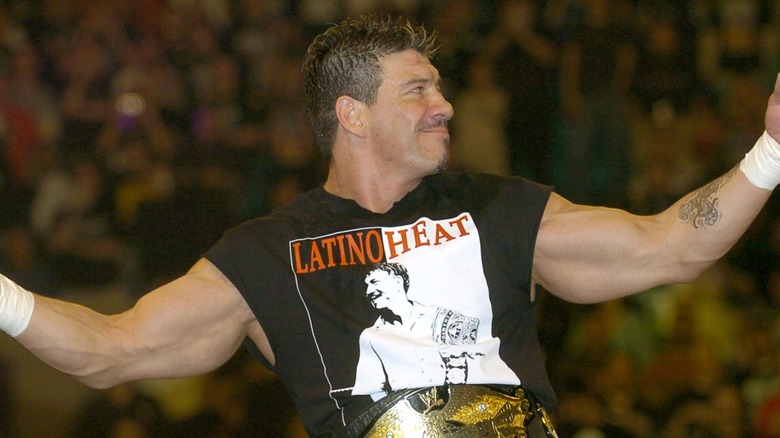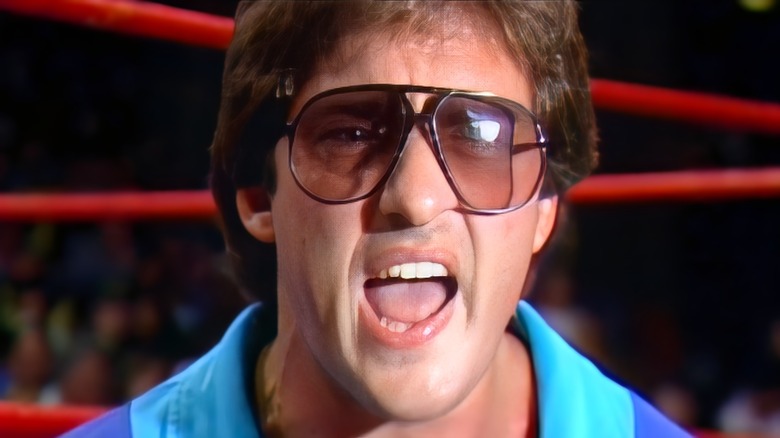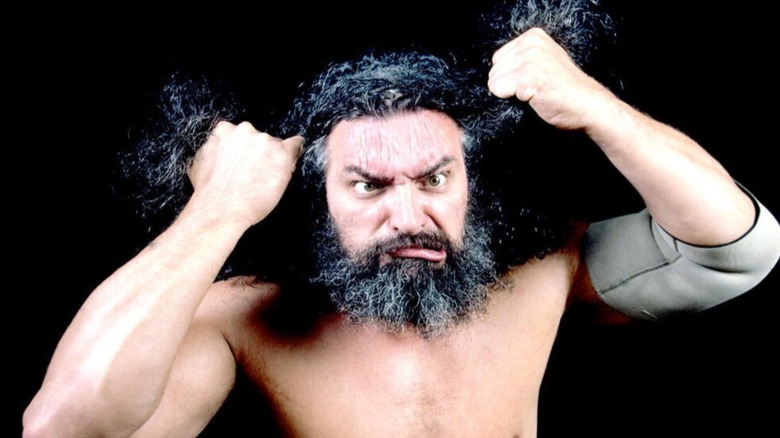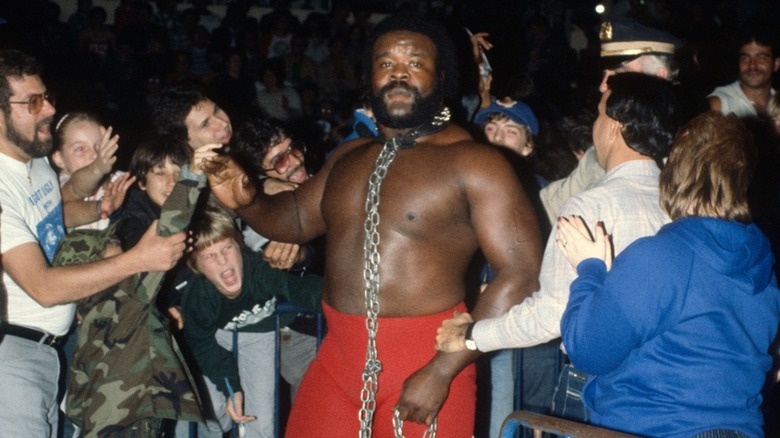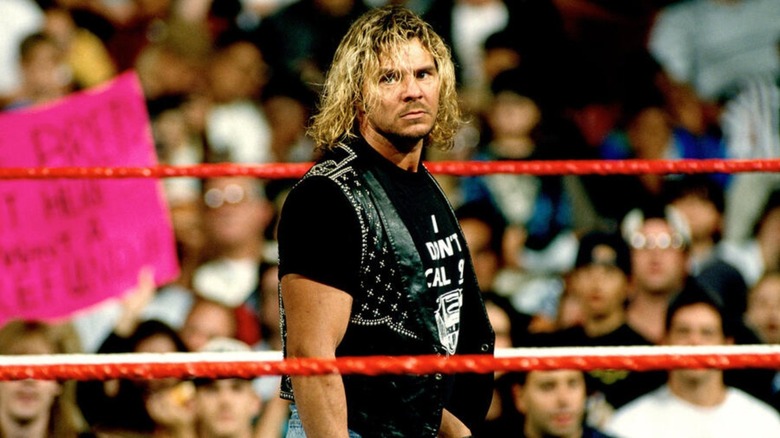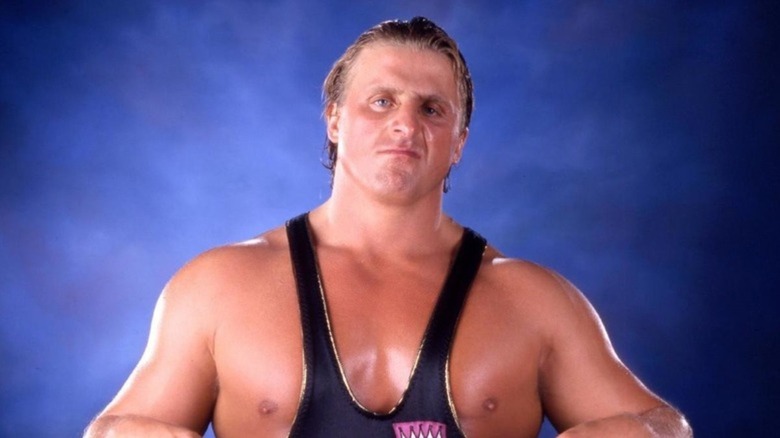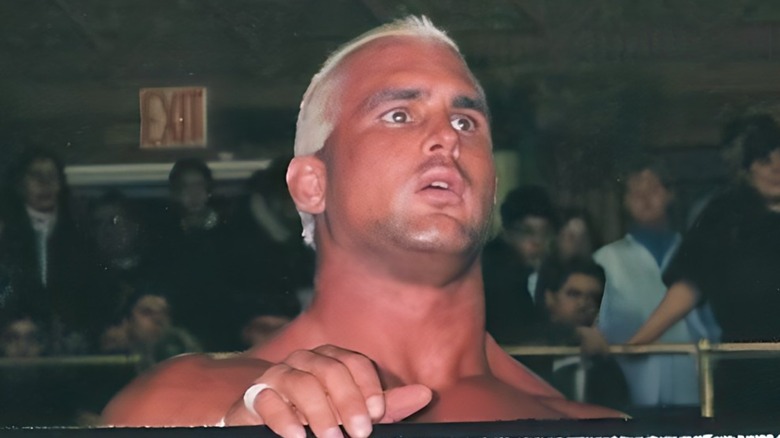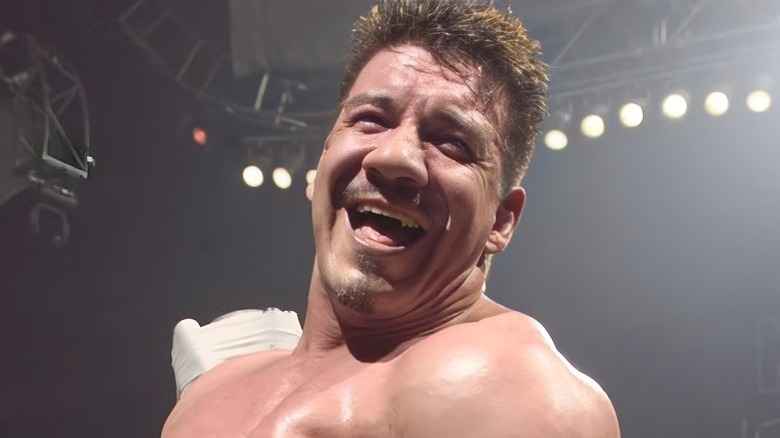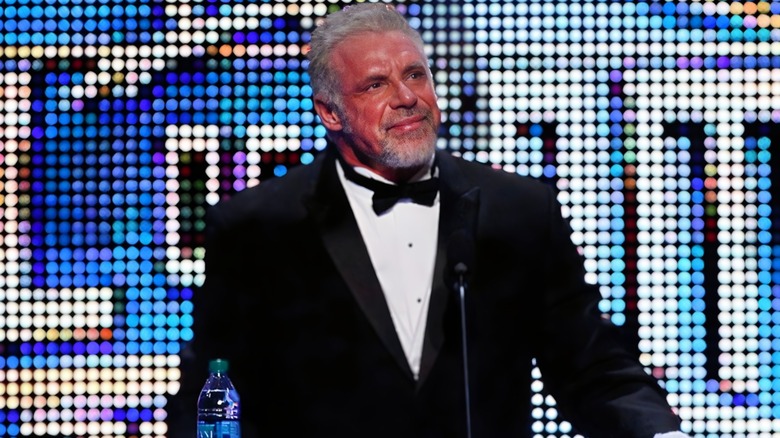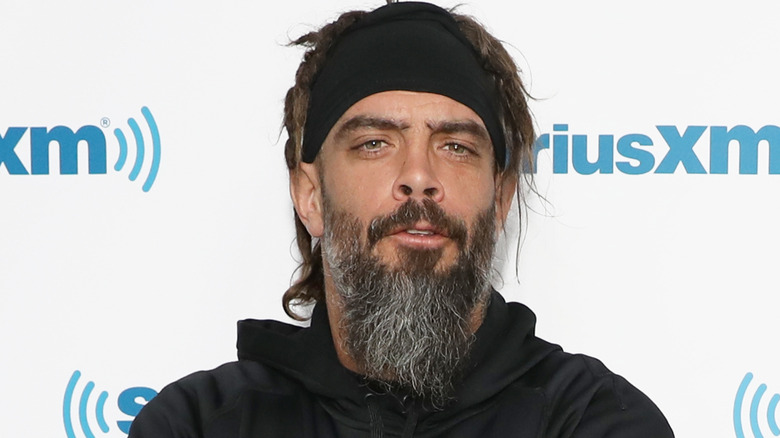Wrestlers Who Had Incredibly Tragic Deaths
If there is one certainty in life, it's that death comes for us all. That might sound morbid and grim, but it's a reality that everyone has to face at some point. However, it's a much harsher reality for professional wrestlers as some don't manage to reach the age where they can be considered elderly. For far too many years, wrestlers have passed away at ages that are considered too young when compared to other industries, with the reasons behind these deaths ranging from substance abuse outside the ring to accidents that have taken place within it.
However, some tales are tragic to the point where even the most hardened wrestling fan has shed a tear for how sad they truly are. This article will detail some tales of men and women who gave everything to the wrestling business, only for their lives to end in the most heartbreaking circumstances.
Gino Hernandez
Gino Hernandez lived life in the fast line in and out of the ring. He routinely paraded his lavish lifestyle to World Class Championship Wrestling fans in the 1980s, where he became one of the company's top heels alongside Chris Adams as one half of The Dynamic Duo. He also partnered up with the likes of Jake Roberts and Bruiser Brody. He won various championships in WCCW, as well as Southwest Championship Wrestling with Tully Blanchard, who claimed interest in bringing Hernandez into The Four Horsemen thanks to his image.
Hernandez passed away at the age of 28 in February 1986. His body was found on the floor of his apartment bedroom a few days after he died, but an official date of death couldn't be determined. His passing has been the subject of much discussion over the years due to Hernandez's ties to the drug underworld, with some people claiming that his death was a "hit" due to the fact that coroners found eight times the usual fatal amount of cocaine in his system. This is the view of Baby Doll, who believes very bad people made an example of Hernandez.
The door to Hernandez's apartment was mysteriously unlocked when his body was discovered, something that was out of character for him, as he always deadbolted it shut, especially after he began experiencing paranoia. Whether it was an acute cocaine overdose or a murder, Hernandez's death is an example of how tragic one's life can be when you get involved with the wrong crowds and very bad habits.
If you or anyone you know needs help with addiction issues, help is available. Visit the Substance Abuse and Mental Health Services Administration website or contact SAMHSA's National Helpline at 1-800-662-HELP (4357).
Bruiser Brody
Bruiser Brody was one of the biggest stars of the 1970s and 1980s. Feared by both wrestlers and fans for his wild persona, Brody became an international star during his prime years thanks to his work in All Japan Pro Wrestling, the Texas territories, and Puerto Rico. The latter is where he tragically lost his life in an incident that is still discussed to this day.
Brody was in the locker room at an event in Puerto Rico when Jose Gonzalez, the booker of the event, invited him into the showers to discuss business. Stories differ depending on who you ask, but the one common thread is that Gonzalez stabbed Brody multiple times. Tony Atlas claimed that the knife Gonzalez used was so sharp that it cut Brody's ponytail off when he dragged his body away in an attempt to save him, but it was too late. Due to the large crowds attending the event, paramedics were unable to get Brody quickly enough, and he passed away due to his wounds, aged just 42.
As far as people being held accountable for Brody's death, Gonzalez was acquitted of murder when the case went to trial as he pleaded self-defense. This was aided by the fact that the foreign witnesses reportedly received their summons after the trial ended, and the knife that was used went missing. Today, people still believe that Gonzalez is guilty, including Brody's widow, Barbara Goodish, Dutch Mantell, and Atlas.
Junkyard Dog
One of the most popular stars of the 1980s didn't have an easy life, but Junkyard Dog overcame everything. His natural charisma in the ring and on the microphone made him beloved by whatever crowd he performed in front of. Whether it was his low-key roles in the WWE or his feud with The Fabulous Freebirds, JYD was a man who overcame the underlying racism in the business at the time to become a significant player. However, his personal life sent him down a much darker path.
The biggest battle of JYD's career was with addiction. He developed a cocaine habit, and his in-ring ability started to dwindle due to his drug usage and unhealthy diet. JYD retired in 1988, but due to a messy divorce from his second wife, he was left with virtually nothing and would appear at autograph signings and independent shows to get by. JYD was open about his struggles with addiction, telling all the kids he met to stay in school and work hard.
On June 1, 1998, JYD attempted to attend his daughter's high school graduation but missed it as he arrived too late. On his way back home, he was involved in a severe single-vehicle car accident that saw his car roll several times, killing him at the age of 45. JYD's daughter accepted her father's induction into the WWE Hall of Fame in 2004, but would also tragically pass away in 2011 at the age of 31 from a heart attack.
If you or anyone you know needs help with addiction issues, help is available. Visit the Substance Abuse and Mental Health Services Administration website or contact SAMHSA's National Helpline at 1-800-662-HELP (4357).
Brian Pillman
By 1996, Brian Pillman had become thoroughly unhinged. He called out Kevin Sullivan for being the WCW booker on television and convinced Eric Bischoff to give him a real way out of his contract to go to ECW and generate buzz before signing with WWE within the span of a few months. Even after a horrific car accident that shattered his ankle and put him in a coma for a whole week, Pillman was able to bring his "Loose Cannon" persona to the national level, where people routinely didn't know what was real and what was kayfabe.
So much so that on October 5, 1997, Pillman missed his call time of 1 p.m. for WWE's In Your House: Badd Blood event, resulting in Jim Cornette phoning the hotel he was staying in. When the manager of the hotel told Cornette, "Mr. Pillman is dead," he didn't believe it at first. However, reality sank in very quickly as the hotel manager told Cornette that the police were on the scene escorting the body off of the premises.
Pillman passed away at the age of 35, with the cause of death being a sudden heart attack. However, the heart attack was triggered by atherosclerotic heart disease, a condition that also led to Pillman's father dying of a heart attack at the age of 55.
Owen Hart
This is arguably the most infamous example of a professional wrestler dying at a young age, and tragically, it could have been prevented. During the WWE's Attitude Era, Owen Hart was one of the only people who pushed back against the use of strong language, adult themes, and less focus on in-ring work, resulting in him adopting the character of "The Blue Blazer," a child-friendly character that Hart was fine portraying as it wouldn't upset his children. His entrance saw him descend from the rafters like a superhero, which went very wrong on May 23, 1999.
At WWE's Over The Edge pay-per-view, Hart was meant to descend from the roof of the Kemper Arena in Kansas City, Missouri, before his match. While waiting for his cue, Hart was secured into his harness, ready to be lowered, but the equipment malfunctioned, and he accidentally triggered an early release button. He plummeted more than 70 feet from the roof of the building to the ring, hitting the top rope, and bouncing onto the canvas. He was transported to a local medical facility where several attempts were made to revive Hart, but the impact of the fall severed his aorta, causing internal bleeding, which ultimately led to Hart dying from blunt force trauma. He was 34.
Since Hart's death, the Hart family has filed lawsuits against WWE, resulting in the company paying $18 million when a settlement was reached. Owen's widow, Martha Hart, established the Owen Hart Foundation charity, which aims to provide university and college scholarships for children in need and contribute to housing for low-income families. The charity partnered with AEW in 2021 and together, have honored Hart's name with an annual tournament.
Chris Candido
Chris Candido made his name in the 1990s, performing all over the United States and Japan. He won tag team gold in the WWE as part of The Bodydonnas, captured the WCW Cruiserweight Championship in 2000, and was one-third of the legendary Triple Threat in ECW, the company where he would arguably achieve his most notable fame. By 2005, Candido was a part of the TNA Wrestling roster and was featured regularly on episodes of "Impact" against the likes of AJ Styles, Dustin Rhodes, and DDP.
At the 2005 Lockdown pay-per-view, Candido dislocated his ankle and fractured his tibia and fibula during a Six Sides of Steel match, where he teamed with Lance Hoyt to take on Sonny Siaki and Apolo. Siaki landed on Candido's leg while performing a dropkick, putting the former ECW star on the shelf for the foreseeable future. Lockdown 2005 took place on April 24; Candido passed away on April 28.
After the injury, Candido was able to appear on the April 25 tapings of "Impact" before he went off to have surgery, where he had titanium plates and screws inserted into his leg. Sadly, on April 28, Candido began feeling unwell throughout the day and collapsed, leading to him being rushed to the hospital. As he was recovering, he developed a blood clot in his leg from surgery complications. However, the surgery also brought on acute pneumonia, causing Candido's lungs to fill with liquid, which is what the autopsy report claimed was the cause of death. He was 33 years old.
Eddie Guerrero
You would be hard-pressed to find a wrestler more beloved and celebrated by fans and wrestlers than Eddie Guerrero. "Latino Heat" overcame his perceived size disadvantage to become one of the most popular wrestlers ever by the mid-2000s, winning the WWE Championship in 2004 from Brock Lesnar. This came after years of perfecting his craft in Japan, Mexico, ECW, and WCW, and by the end of 2005, Guerrero was set to be in line for another push towards the title picture.
On November 13, 2005, Eddie's nephew, Chavo Guerrero, was told by the staff at the Marriott Hotel City Center in Minneapolis, Minnesota, that his uncle hadn't answered his wake-up call and that he was still in his room as the latch was still on his door. Once his door was broken down, Chavo found Eddie on the bathroom floor, holding his toothbrush and responsive but frothing at the mouth. Medical personnel did all they could to resuscitate Guerrero, but it was no use, and he passed away at the age of 38, with the cause of death being a heart attack caused by an underlying atherosclerotic cardiovascular disease that caused him to keep losing consciousness throughout the day.
The WWE "Super Show" that was meant to take place that weekend became a taping of "Raw" and "Smackdown" designed to honor the memory of Guerrero, with a ten-bell salute, memorable exhibition matches, talking head segments, and video packages chronicling his career. To this day, Guerrero's influence can still be found in wrestlers worldwide whenever they use a frog splash. Rey Mysterio also paid tribute to Guerrero at WWE WrestleMania 40 by recreating his late friend's entrance before his match.
The Ultimate Warrior
Jim "The Ultimate Warrior" Hellwig had an eventful career as a professional wrestler. While limited in his abilities between the ropes compared to some of his peers, he drew enormous crowds for WWE in the late 1980s, leading to him beating Hulk Hogan at WrestleMania 6 in 1990. This would ultimately be the highlight of his career as his popularity would slowly decrease, and his backstage attitude rubbed many people the wrong way.
Despite a strained relationship with WWE in the 2000s, Warrior returned for a controversial Hall of Fame induction in 2014, reminding everyone why he was as popular as he was in his prime. He appeared at WWE WrestleMania 30 in New Orleans, Louisiana, as part of the 2014 Hall of Fame class. On the April 7 edition of "WWE Raw," he cut what would tragically be his final promo, which included harrowing lines about hearts beating their final beats and the spirit of The Ultimate Warrior running forever.
Warrior collapsed on April 8 and was rushed to a nearby hospital, where he was pronounced dead at the age of 54 after suffering a heart attack. Some people across WrestleMania 30 weekend noted that he was sweating profusely whenever they saw him and that his breathing was labored. Still, no one could have predicted that those would be Warrior's final few days before he passed.
Hana Kimura
Before the COVID-19 pandemic shut down the world, Hana Kimura looked like she would be Japan's next big wrestling star. Her work in STARDOM, JWP, and Wrestle-1 earned her international acclaim from fans and critics, and she had already won several championships as a teenager. She had also become a reality TV star in Japan thanks to her appearances on "Terrace House: Tokyo 2019-2020." However, the world shut down, and everyone was forced indoors, leading to many people spending the bulk of their time on the internet.
During Kimura's time on "Terrace House," she would get into an altercation with a cast member, which was reportedly staged to add drama to the show. Because of this, she started receiving hateful messages from people on social media, with some calling her out for her actions on the show, while others called her names and were even racist due to her mixed heritage. A bombardment of hateful messages combined with the isolation of COVID-19 resulted in Kimura being sent into a depression spiral.
Kimura began posting distressing images on her social media feeds of her harming herself while also sharing some of the hateful messages she had been getting from people. Tragically, she was reported dead later that day, with Dave Meltzer confirming that the official cause of death was hydrogen sulfide inhalation. Kimura's death was officially ruled a suicide and two men were subsequently arrested for cyberbullying, while a third had a lawsuit filed against them by the wrestling star's mother.
If you or someone you know is struggling or in crisis, help is available. Call or text 988 or chat 988lifeline.org
Jay Briscoe
When AEW President Tony Khan announced that he had bought Ring of Honor in 2022, fans worldwide were buzzing about potentially seeing the Briscoe Brothers on a national level. However, one WarnerMedia executive never felt comfortable allowing Mark and Jay Briscoe on their TV networks due to homophobic remarks Jay had made in the past — comments that Briscoe not only apologized for but would go out of his way to educate himself about to make sure he didn't make the same mistake again.
By the end of 2022 and going into 2023, many people thought that the Briscoes' time on TV would come, especially after their wars with FTR over the ROH World Tag Team Championships. However, that wasn't to be. On January 17, 2023, Jay Briscoe died while driving his daughters to cheerleading practice. The tragedy occurred after a car driving the opposite way suddenly crossed over into the path of his vehicle, resulting in a head-on collision. Jay was pronounced dead at the scene, as was the other driver, while Jay's daughters suffered multiple injuries
Jay was 38 when he passed away, but his brother Mark finally got to show what "Dem Boyz" were all about when the outpouring of love and support for the Pugh family (Jay's real last name) resulted in him making his debut for AEW on January 25, 2023, which would have also been Jay's 39th birthday. Mark has since been signed to a full-time contract with AEW, and the ROH Tag Team Championship belt design they were synonymous with was retired in 2023, as the Briscoes were the champions at the time of Jay's untimely death.
